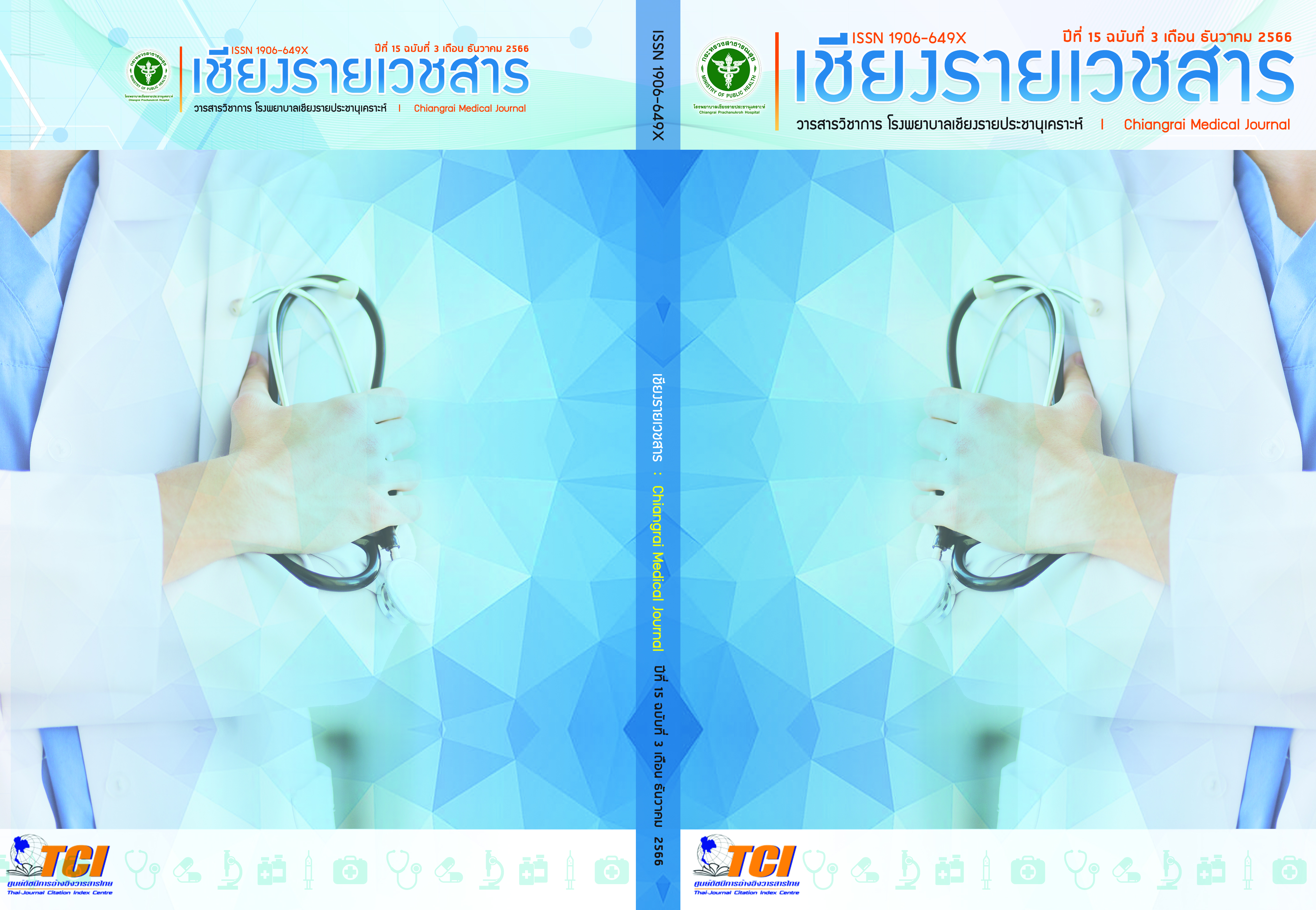ปัจจัยทางคลินิกที่ส่งผลต่อผลลัพธ์การฟื้นฟูสภาพระดับดี ในผู้ป่วยโรคหลอดเลือดสมอง ที่เข้าโครงการฟื้นฟูผู้ป่วยระยะกลางของจังหวัดเชียงราย
Main Article Content
บทคัดย่อ
ความเป็นมา: การฟื้นฟูผู้ป่วยโรคหลอดเลือดสมองในหอผู้ป่วยในที่โรงพยาบาลเชียงรายประชานุเคราะห์มีข้อจำกัดเรื่องเตียงและระยะเวลาการนอน จึงมีการจัดบริการหอฟื้นฟูผู้ป่วยระยะกลางขึ้นในโรงพยาบาลชุมชน การหาปัจจัยพยากรณ์ผลลัพธ์ของการฟื้นฟูสมรรถภาพในผู้ป่วยหลอดเลือดสมอง จะช่วยให้สามารถคัดเลือกผู้ป่วยเพื่อส่งต่อไปยังหอฟื้นฟูผู้ป่วยระยะกลางได้อย่างมีประสิทธิภาพมากยิ่งขึ้น
วัตถุประสงค์: เพื่อศึกษาปัจจัยทางคลินิกที่ส่งผลต่อระดับคะแนน Barthel index (BI) ในระดับดีของผู้ป่วยโรคหลอดเลือดสมองที่ได้รับการฟื้นฟูในโครงการฟื้นฟูผู้ป่วยระยะกลาง
วิธีการศึกษา: การศึกษาย้อนหลัง จากเวชระเบียนอิเล็กทรอนิกส์ในช่วงเดือนมกราคม 2564 ถึง สิงหาคม 2565 โดยแบ่งผู้ป่วยเป็น 2 กลุ่มตามระดับคะแนน BI หลังได้รับการฟื้นฟู 6 เดือน ได้แก่ กลุ่มที่มีผลลัพธ์ดี (BI > 18) และกลุ่มที่มีผลลัพธ์ไม่ดี (BI <9) เก็บข้อมูลพื้นฐานและผลลัพธ์การรักษาของผู้ป่วย นำข้อมูลที่ได้มาวิเคราะห์ข้อมูลด้วยสถิติ t-test, rank sum test, exact probability test, multivariable logistic regression analysis กำหนดค่าระดับนัยสำคัญทางสถิติไว้ที่ p<0.05
ผลการศึกษา: ผู้เข้าร่วมวิจัยทั้งหมด 240 ราย เป็นเพศชายร้อยละ 62.92 อายุเฉลี่ย 59.75 ±13.01 ปี แบ่งเป็นกลุ่มผลลัพธ์ดี 160 ราย (ร้อยละ 66.67) และกลุ่มผลลัพธ์ไม่ดี 80 ราย (ร้อยละ 33.33) พบว่าปัจจัยที่มีความสัมพันธ์อย่างมีนัยสำคัญทางสถิติในผู้ป่วยกลุ่มผลลัพธ์ที่ดี ได้แก่ อายุน้อยกว่า 60 ปี (Adjusted OR=8.26, p=0.001) ไม่มีประวัติโรคความดันโลหิตสูง (Adjusted OR=4.32, p=0.03)หรือ ไตวายเรื้อรัง (Adjusted OR=7.96, p=0.03) ไม่เคยเป็นโรคหลอดเลือดสมองมาก่อน (Adjusted OR=5.24, p=0.022) การไม่พบภาวะแทรกซ้อนระหว่างการรักษาที่โรงพยาบาลเชียงรายประชานุเคราะห์ (Adjusted OR=19.46, p=0.007) และขณะก่อนส่งเข้าโครงการฟื้นฟูผู้ป่วยระยะกลาง ผู้ป่วยมีระดับความรู้สึกตัวปกติ (Adjusted OR=6.29, p=0.048) และมีกำลังกล้ามเนื้อมากกว่าหรือเท่ากับ 3 (Adjusted OR=17.31, p= <0.001)
สรุปและข้อเสนอแนะ: ปัจจัยทางคลินิกดังกล่าว สามารถนำมาใช้เป็นเกณฑ์ในการช่วยคัดเลือกผู้ป่วยเพื่อส่งต่อไปบำบัดฟื้นฟูที่หอฟื้นฟูผู้ป่วยระยะกลางในโรงพยาบาลระดับชุมชนได้ ในการศึกษาครั้งต่อไปควรเป็นการศึกษาแบบเก็บข้อมูลไปข้างหน้า เพื่อที่จะสามารถเก็บข้อมูลหรือปัจจัยทางคลินิกที่เกี่ยวข้องได้ครบถ้วนมากขึ้น
Article Details

อนุญาตภายใต้เงื่อนไข Creative Commons Attribution-NonCommercial-NoDerivatives 4.0 International License.
เอกสารอ้างอิง
Suwanwela NC. Stroke epidemiology in Thailand. J Stroke. 2014;16(1):1-7
Buapha T, Noontum P, Phuthakun P, Phanyaphu D,Teerachaisakul M, Pongpirul K. Variables and assessment in stroke research: a systematic review. Academic Journal of Mahasarakham Provincial Public Health Office. 2021;5(10):76-86.
Pholherm P. Effectiveness of intermediate phase stroke inpatient rehabilitation in intermediate ward versus conventional rehabilitation at community hospital. Chiangrai Medical Journal. 2022;14(2):1-16.
Samuthpongtorn C, Jereerat T, Suwanwela NC. Stroke risk factors, subtypes and outcome in elderly Thai patients. BMC Neurol. 2021;21(1):322.
Wattanapan P. Rehabilitation and complication prevention in stroke patient. North-Eastern Thai Journal of Neuroscience. 2018;12(1):31-43.
Kuptniratsaikul V, Kovindha A, Dajpratham P, Piravej K. Main outcomes of stroke rehabilitation: a multi-centre study in Thailand. J Rehabil Med. 2009;41(1):54-8.
Salter K, Jutai J, Hartley M, Foley N, Bhogal S, Bayona N, et al. Impact of early vs delayed admission to rehabilitation on functional outcomes in persons with stroke. J Rehabil Med.
;38(2):113-7.
Pattanasuwanna P. Outcomes of intermediate phase post-stroke inpatient rehabilitation in community hospital. Formerly. ASEAN J Rehabil Med. 2019;29(1):8-13.
Mahoney Fi, Barthel DW. Functional evaluation: the barthel index. Md State Med J.
;14:61-5.
Dajpratham P, Meenaphan R, Chan P, Phianmanakit S, Chandrakasemjit S, Yuwan A. The Inter-rater reliability of Barthel Index (Thai Version) in stroke patients. J Rehabil Med. 2006;16(1):1-9.
Quinn TJ, Langhorne P, Stott DJ. Barthel index for stroke trials:development, properties, and application. Stroke. 2011;42(4):1146–51.
Uyttenboogaart M, Stewart RE, Vroomen PC, De Keyser J, Luijckx GJ. Optimizing cutoff scores for the Barthel index and the modified Rankin scale for defining outcome in acute stroke trials. Stroke. 2005;36(9):1984-7.
Paolucci S, Antonucci G, Pratesi L, Traballesi M, Lubich S, Grasso MG. Functional outcome in stroke inpatient rehabilitation: predicting no, low and high response patients. Cerebrovasc Dis. 1998;8(4):228-34.
Vázquez-Guimaraens M, Caamaño-Ponte JL, Seoane-Pillado T, Cudeiro J. Factors related to greater functional recovery after suffering a stroke. Brain Sci. 2021;11(6):802.
Intaratep N, Suksathien R. Clinical predictors of good functional outcome in patients
with acute stroke. ASEAN J Rehabil Med. 2022;32(2):116-22.
Kongsawasdi S, Klaphajone J, Watcharasaksilp K, Wivatvongvana P. Prognostic factors of functional recovery from left hemispheric stroke. ScientificWorldJournal. 2018;2018:4708230.
Veerbeek JM, Kwakkel G, van Wegen EE, Ket JC, Heymans MW. Early prediction of outcome of activities of daily living after stroke: a systematic review. Stroke. 2011;42(5):1482-8.
Suksathien R, Sukpongthai T. Predictors of long-term functional outcomes in acute stroke patients. J Thai Rehabil Med. 2017;27(3):96-100.
Harvey RL. Predictors of functional outcome following stroke. Phys Med Rehabil Clin N Am. 2015;26(4):583-98.
Woldag H, Gerhold LL, de Groot M, Wohlfart K, Wagner A, Hummelsheim H. Early prediction of functional outcome after stroke. Brain Inj. 2006;20(10):1047-52.


